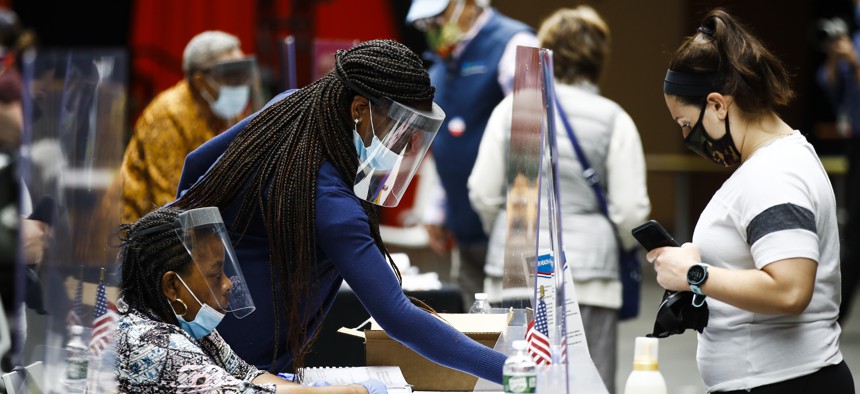Connecting state and local government leaders
Some states that tried to transition to primarily mail-in elections Tuesday saw problems, including long lines at polling places and requested absentee ballots that never made it to voters.
The primary elections held Tuesday in several states were seen as a critical test ahead of the presidential election of election officials’ ability to expand absentee and early voting in response to the coronavirus outbreak.
But problems that emerged Tuesday, including hours-long waits at polling places, requested mail-in ballots that were never delivered and botched ballots, underscore the difficulties that officials still face as they prepare for much larger turnout in November.
States shouldn’t expect that efforts to expand absentee voting will be a magic bullet, particularly in regions that have not historically seen much reliance on voting by mail, said John Fortier, the director of governmental studies at the Bipartisan Policy Center.
“Each state has to think a little more realistically in what it’s been doing before and how much it is going to change,” he said. “As well as states try to plan for it, we still have to think about early voting and polling place voting during the election.”
Problems can arise when elections offices try to rely too much on absentee voting to avoid having to open up polls and don’t allocate the resources to support voters who opt for election-day voting, Fortier said.
In Washington, D.C., three times the number of people requested ballots to vote by mail than cast ballots in person—with around 33,000 voters showing up at the polls Tuesday. But the city’s 20 voting centers, down from more than 100 precincts that are normally staffed during an election, were overwhelmed. Some voters reported waiting in line as long as four hours.
“I know D.C. voters spent hours at the polls yesterday. That is nothing short of failed execution,” said D.C. Mayor Muriel Bowser on Wednesday.
The mayor said she hoped to be debriefed by the independent D.C. Board of Elections, which continued collecting and counting ballots on Wednesday, and expects election officials to have an “appropriate action plan” for November. Bowser stopped short of saying she’d ask for resignations from board members but said she “could not tolerate a continued failed leadership or execution.”
But in Maryland, that’s exactly what Lt. Gov. Boyd K. Rutherford did Wednesday after voters encountered multiple problems, ranging from delayed distribution of ballots to counting errors.
The state transitioned to a mostly mail-in primary election for the first time and automatically mailed all eligible voters a ballot. Problems began to surface in the weeks leading up to the election when state officials said hundreds of thousands of ballots had not yet been delivered to Baltimore-area residents. While trying to tally results Tuesday, election officials admitted that a printing error on some ballots for a Baltimore city council race meant they could not be scanned, the Baltimore Sun reported.
“I really think it’s time for the administrator at the Board of Elections to step down," said Rutherford, a Republican who serves under Gov. Larry Hogan.
Errors involving ballots and voting machines also created issues for some voters in Pennsylvania, where a record number of people sought absentee ballots. Some polling places in Philadelphia received the wrong voting machines, and elsewhere voters said they had to vote in person Tuesday because they did not receive mail-in ballots in time.
In Indianapolis, Indiana, only 22 of 270 polling places were open Tuesday and voters faced longer lines than is typical. But elections officials told the Associated Press they didn’t have the staff to open more polling places.
“It was impractical for us to have anything close to the normal number of locations during a pandemic,” said Russell Hollis, deputy director of the Marion County clerk’s office. “It has been very difficult for us to recruit enough poll workers during the pandemic.”
The problems encountered by election officials Tuesday highlight the need for states to have a holistic plan that incorporates all aspects of voting procedure, from requesting and counting ballots to recruiting poll workers and ensuring an appropriate number of polls are open, said Ellen Moorhouse, deputy communications director at RepresentUs, a nonprofit that supports election reforms.
“I think we learned a lot of lessons yesterday about having a plan,” she said.
Absentee and early voting has been on the rise over the last decade and states should expect to see an even larger jump in the upcoming November election, Fortier said.
To prepare for increased reliance on mail voting in the November elections, Moorhouse said states should examine absentee voting data from their primaries—including how many ballots were requested and returned, as well as the timeframe in which the ballots were sent out to voters.
“When were they requested? When were they mailed?” she said. “Was it a four-week process, was it six, was it eight? Do we need to start now?”
If the coronavirus still remains a threat and social distancing measures are in effect during the November elections, as health experts have warned will certainly be the case, elections officials may have to give more thought to their capacity at polling sites, Fortier said.
“There are challenges because of Covid-19 that make resource allocation tougher,” he said. “You can’t accommodate people in the same way or might not have as much capacity.”
The good news, Fortier said, is that states that experienced problems during Tuesday’s primary will have more time to learn from their mistakes before the presidential election.
“As bad as yesterday may have been, the presidential election dwarfs every other election in terms of turnout,” he said. “There is a lot of pressure on it.”
Andrea Noble is a staff correspondent with Route Fifty.

NEXT STORY: Minnesota Presses for Oversight of Minneapolis Police—Will Other States Follow?



